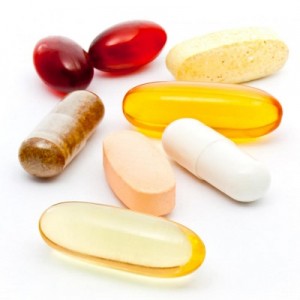By Livia Ly MS RD LDN. You are a weight trainer and you eat adequate amounts of carbs, protein and fat. You also take supplements, sleep well, rest enough, train hard, and change your training periodically. But still, it seems like you’ve hit a plateau trying to build more muscle. There could be multiple reasons for this, but one that I’m particularly interested in is a deficiency of micronutrients. There is no point in having a high calorie / protein diet if your body is lacking key nutrients that are crucial for specific reactions to form extra muscle cells. Some of these nutrients are needed for amino acid metabolism, others are indirectly related because they increase insulin sensitivity, which promotes muscle building through a pathway called the mTOR Signaling Pathway. Ok, enough of the geeky stuff, let’s take a look at a list of vitamins and minerals to take into consideration and check for possible deficiencies, so you can have meal plans created by your dietitian that are right for you.
- B-complex vitamins: physiologically speaking, vitamins B2, B6, and folate are all associated with the amino acid metabolism and transamination.
Rich food sources of B vitamins: beans, dark green leafy vegetables, all meats, cruciferous vegetables, tempeh, yogurt, crimini mushrooms, sweet potato, bell peppers, beets, parsley, sea vegetables, banana, sunflower seeds.
- Chromium: it has been suggested that chromium not only increases insulin sensitivity but also protects against muscle atrophy by preventing muscle degradationB.
Rich food sources of chromium: brewer’s yeast, beef, wheat and barley, mussel, shrimp and oyster, Brazil nut, dried dates, pear, tomato, mushroom, broccoli.
- Vitamin D: it is also recommended to adjust deficiency of vitamin D, considering its crucial role in the skeletal muscle, as vitamin D deficiency may promote insulin resistanceC,D.
Rich food sources of vitamin D: salmon, sardines, cow’s milk, tuna, eggs, and shiitake mushrooms.
- Magnesium: as the fourth most abundant element in the body and involved in hundreds of enzymatic reactions, magnesium also play a role in protein synthesisA.
Rich food sources of magnesium: magnesium is part of chlorophyll, thus plants contain high amounts of it. Dark green leafy vegetables, seeds, and beans are great sources.
- Zinc: the relationship between this mineral and protein synthesis is similar to that of chromium. Zinc may participate on the insulin signaling and proliferation of muscle cellsE.
Rich food sources of zinc: red meat, spinach, asparagus, shiitake and crimini mushrooms, seeds, and beans.
- Iodine: makes thyroid hormones and these hormones promote protein synthesis. So, iodine is directly related to muscle building as well.
Rich food sources of iodine: sea vegetables, scallops, cod, yogurt, and shrimp.
There you have it. A balanced, nutritious, adequate and complete diet plan is crucial for your goal of muscle building. If possible, talk to your doctor and ask him or her to check your health by measuring your vitamin D, or checking your thyroid health, for example.
References
A) de Baaij JH, Hoenderop JG, Bindels RJ. Magnesium in man: implications for health and disease. Physiol Rev. 2015;95(1):1-46.
B) Dong F et al. Chromium supplement inhibits skeletal muscle atrophy in hindlimb-suspended mice. J Nutr Biochem. 2009;20(12):992-9.
C) Garcia LA et al. 1,25(OH)(2)vitamin D(3) enhances myogenic differentiation by modulating the expression of key angiogenic growth factors and angiogenic inhibitors in C(2)C(12) skeletal muscle cells. J Steroid Biochem Mol Biol. 2013;133:1-11.
D) Girgis CM et al. Effects of vitamin D in skeletal muscle: falls, strength, athletic performance and insulin sensitivity. Clin Endocrinol (Oxf). 2014;80(2):169-81.
E) Ohashi K et al. Zinc promotes proliferation and activation of myogenic cells via the PI3K/Akt and ERK signaling cascade. Exp Cell Res. 2015;333(2):228-37.
BIO – Check out my site at http://www.nutri.ly/



